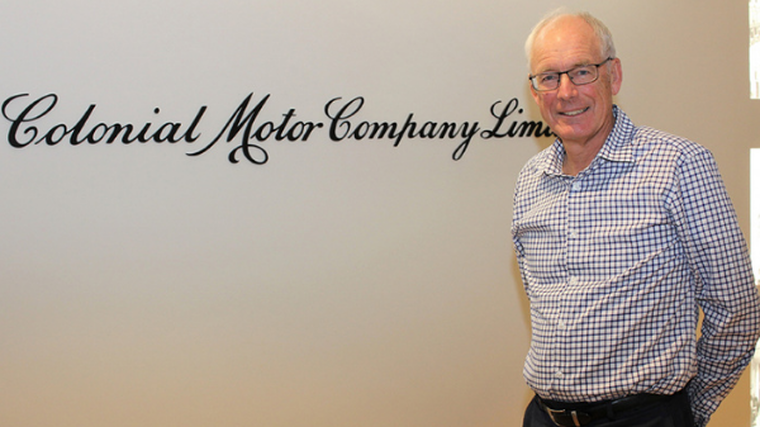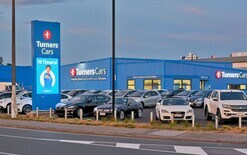Holden’s exit ‘creates problems for everyone’

Holden quitting the New Zealand market has exposed the “delicate relationships” between dealers and marques, according to the chairman of the Colonial Motor Company.
Jim Gibbons says the decision by General Motors (GM) to axe the lion-and-stone brand from New Zealand, Australia and Thailand by the end of 2020 has impacted the whole new-vehicle industry.
“Holden’s exit from New Zealand, is one less competitor, but it is not a cause of celebration,” he explains.
“Instead it creates problems for everyone. It upsets the balance between dealers and their franchisors, as the old Holden dealers look to swap their empty sites into other brands and some franchisors use the opportunity to change their dealers.
“The partnership, the tension, between franchisor and franchisee is delicate; the exit of Holden exposes how delicate the relationships are.”
Gibbons, pictured, made the comments in his report to Colonial’s annual meeting in Wellington on November 6.
He describes the decision by GM to close the Holden brand as a “reality check” on the small scale and international significance of our new-vehicle market.
Gibbons adds that the “scattered and fragmented” right-hand drive market is restricted to Japan, UK and old British Commonwealth countries, whereas the big markets – such as North America, Europe and China – are all left-hand drive.
“General Motors do not have a presence in Japan, and when they sold their British and European subsidiary, Opel, it was obvious that Australia and New Zealand were not big enough to justify a full range of specially adapted products,” he notes. “In a way it’s surprising that they did not exit immediately after selling Opel.
“New Zealand is in the minority right-hand-drive market, and within that it has quite distinct preferences. Unlike right-hand-drive Britain, we like automatics; unlike right-hand-drive Japan, we like vehicles that can tow.
“As the international car markets evolve and increasingly fragment into different technologies, we cannot assume that our preferences will always be available.”
Coping with Covid
Gibbons is full of praise for how dealers dealt with the impact of the Covid-19 pandemic this year, including a lockdown that forced dealerships to “go into hibernation at the same time”.
“Lockdown had a dramatic impact, especially on the car dealerships,” he says. “The dealerships management, all of them, faced unprecedented problems, pressures, and huge uncertainty.
“In addition, as individuals, they had to cope with the numerous personal pressures that arose. They managed exceptionally well.
“I want to acknowledge and thank them for that effort … Cash was retained, employees were retained, customers were retained.”
Gibbons told the meeting it has been a challenging time for Colonial and revenue for the first eight months of the 2020 financial year was already down on the previous year before the coronavirus shook the industry.
As consumer confidence fell because of the Covid-19 crisis, the company saw its group revenue in March down 37 per cent from the same time a year earlier.
“Revenue for the second half of the year was down 24 per cent, 17 per cent for the full year, with the worst month, April, down 82 per cent on the previous year,” notes Gibbons.
“Despite the revenue drop, employment was retained, total employees at the end of June was 965, only three per cent down on the same time 12 months earlier.
“The revenue bounce after lockdown ended started unevenly, but soon was stronger than expected.
“We have bounced back to a level of revenue that is similar to last year. But we have not recovered the revenue lost during lockdown or the periods immediately before and after.”
Gibbons says the market post-Covid is different to the immediate past with near new used-vehicle sales strong and defying industry predictions from earlier in the year.
However, he warns trade may suddenly slow down if consumer confidence suffers another hit. “But for now, to use a concept that is familiar to salesmen, buyers are buying, not just looking. Its day-by-day trading, but it adds up.”
He adds that Colonial’s strong balance sheet and experienced management has been key to getting it through the past six months.
Property developments
Colonial says it has had an unusually large number of property developments and upgrades under construction or completed during FY2020.
These include the opening of a new company-owned service centre in Wanaka, with one half of the building branded Macaulay for Ford and Mazda, the other half branded Southern Lakes for Mitsubishi and Nissan. “Individually, none of them could justify being in Wanaka, but a cluster of four can,” notes Gibbons.
In Christchurch, work is under way to put the city’s planned greenway through Team Hutchinson Ford’s workshop. This involves demolishing part of the 1930s era workshop and rebuilding the administration and sales buildings. The project is expected to be completed early in 2021.
Work is taking place to build separate Ford and Mazda showrooms and workshops alongside the existing Stevens Motors site on High Street, Lower Hutt.
South Auckland Motors has fully upgraded its showroom on Great South Road and it was officially opened in October 2020. Meanwhile, Colonial is developing a site at Botany into a Suzuki and Isuzu facility for Southern Autos Manukau.
A new separately leased facility for Nelson Kia in Rutherford Street was also occupied early in 2020.
Looking ahead
Gibbons reports trading profit for the first quarter of the 2021 financial year is higher than last year and says it reflects “ongoing skilled management of details to ensure the best result from the available activity”.
“This financial year has started on a positive note. Despite a two per cent drop in overall revenue, trading profit for the first quarter, July to September, is up on last year,” he explains.
“There are some forward orders, some supply shortages. If it carries on at the current level, then the half year will be ahead of last year.
“But it can all suddenly slow down again. Confidence is fragile, we all live for today, and start again tomorrow.”





